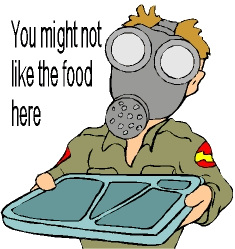How do you make your point?
'Making a point' is how you get someone to understand what you mean and how you feel about it. Here, understanding a language is more than about understanding only the words – we also have to understand the meaning. With the English this is particularly difficult because sometimes the meaning is exactly the opposite of what the words actually say. For example, if an English person calls a friend 'Einstein' this is not because he thinks that this person is as clever as that great scientist. It is much more probable that the friend has just done something stupid, or has missed something which he should have seen.
For example:
'What is John doing here?'
'It's his house, Einstein.'
Very often when English people want you to think about what you have done or said they will do this indirectly, by using irony or rhetorical questions. They also tend to describe something very important by using understatement. In this section we will look at these three ways of making a point, and leave another very English technique – sarcasm – for the next section.
Shall we look at Rhetorical Questions?
What is a rhetorical question? Well, the previous two question in this text were sentence rhetorical, because they do not actually expect an answer. The purpose of the questions here is not to seek information, but to get the person being asked the questions to think about them, why they were asked and what to do next.
A good example is the question 'What did you say?' when it is asked of someone who has said something offensive. In fact, the listener has heard and understood every word, so that is not why he asks the other person to repeat what he has said. Instead the question is rhetorical. The real meaning is 'Think about what you have just said, because it has made me angry. Do you really want that?'
This is the moment when the original speaker can either try to take back what was said 'No, I didn't mean so say …', or can he start a fight by saying 'You heard me', which means 'Yes, I know that what I said made you angry. I wanted to do that.'
For example:'Of course, your sister is a bit too fat to have a boyfriend.'
'Wait. What did you just say?'
'Well, actually she does have a lovely personality. Anyway, weight is not important.'
With actions the same sort of rhetorical question is used by a person who does not like what is being done. This time the question is 'What do you think you are doing?' The person asking the question knows exactly what is happening, but the question is asked because what is being done is offensive, dangerous or stupid. When the action results in the expected disaster, a common follow-up rhetorical question is 'Are you happy now?'.

Other rhetorical questions which are really a way of asking someone to think about what they are doing or saying are 'Are you joking?' and 'Seriously?'
Another common rhetorical question is 'Can I help you?' Sometimes this is really an offer to help, but sometimes it means 'What are you doing here? Explain yourself.'
A rhetorical question can also be used to urge someone to do something, or to tell him that it is about to happen. For examples 'Who wants some cake?' ('I am now giving out the cake'), 'Well, are you coming?' (I know you are coming, but I want you to hurry up.) 'Are you ready?' (Something is about to happen.)
There are many other kinds of rhetorical questions – some of these are dealt with in the Elementary part of the course, and more difficult rhetorical questions are in Advanced.
Irony
Irony is how the English say one thing when they mean the opposite. This often confuses non-English speakers who sometimes understand only the literal meaning of the words. 'Oh good! Your mother is here.'
For example:
''Oh good! Your mother is here.'.'
Might really mean 'Oh no! Your mother is here again. Can't she leave us alone?'
This is true even if the wife sounds really happy to see her mother-in-law at the door. The irony is meant to make the husband think 'Why is my wife so happy to see my mother? Oh … perhaps she isn't.'
'Oh, a romantic movie. I love romances.'
(Meaning, 'I do not want to watch a love story.') 'Oh yes, because you never make me watch sports'
(Meaning 'We watch sport all the time. It's my turn to choose the program tonight.')

If someone has given an opinion very strongly, irony might be used to suggest that the speaker should control himself a bit.
For example:
'The service in this restaurant is terrible! The food is awful. The manager should be fired. I hate it here!'
''Why don't you tell us what you really think about this place?'
For example:
'Dracula is not a nice person.'
'Oh, really?'
'The Sahara is very dry'.'
'Do you think so?'
Irony is also used to point out the most important part of a situation by deliberately ignoring it and mentioning something trivial instead. For example if a house is underwater after a flood, an Englishman might remark 'Well, I don't need to water the pot plants'.
The way to tell if someone is being ironic is if their words do not fit with the situation (For example someone asks a person who is driving too fast 'Can you go any faster?'), or if that person's words are obviously not true. (For example 'Jim is a great cook', when Jim has just produced a terrible meal.) If this happens, it is possible the speaker is being ironic.

Understatement
When a person who has won the lottery says 'I'm rather pleased', this is an understatement. When somebody is shouting and screaming and throwing the furniture around, the words 'He is a little upset' are an understatement. The English often use understatement because they are uncomfortable describing something dramatic, and they do not like to sound too enthusiastic or upset.
For example:
'So, how do you feel about breaking both legs and missing the championship?'
'Well, it is inconvenient.'

This is why in English 'Not bad' means 'Good', and 'Not good' means 'very bad'. If a doctor tells a patient that his test results are 'Not good news' the patient has good reason to panic. If something 'Didn't really work' then it was probably a complete failure. Something a 'bit difficult' is extremely hard, and 'a small problem' can describe anything from a broken fingernail to the start of a nuclear war.
For example:
'Houston, we have a problem.'
(The famous report by the crew of Apollo 13 that their spaceship was coming apart, thousands of miles from Earth.)
As a result if someone passes you a plate and warns 'It is a bit hot', be ready for the plate to burn your fingers. If someone is described as 'Not very happy' with something you have done, expect that person to be furious.
Understatement is also used to avoid boasting. 'I did okay in the competition' says the person who was champion. 'We know where the next meal is coming from' says the millionaire. 'It turned out rather well', says the man who made millions of dollars with his invention.
Often understatement is used to make someone think about the real situation. When there is deep snow outside the (under)statement. 'You might need a jacket', is a warning to think about what you actually need to wear. 'The sharks here are rather unfriendly', is a warning not to swim on a particular beach.

Well, that was easy, wasn't it? Nothing to think about at all, really. Hmm. Perhaps in one, maybe two places. Shall we try some exercises?



